The Stolen Generation: A Legacy of Loss, Identity, and the Fight for Reckoning
The Stolen Generation: A Legacy of Loss, Identity, and the Fight for Reckoning
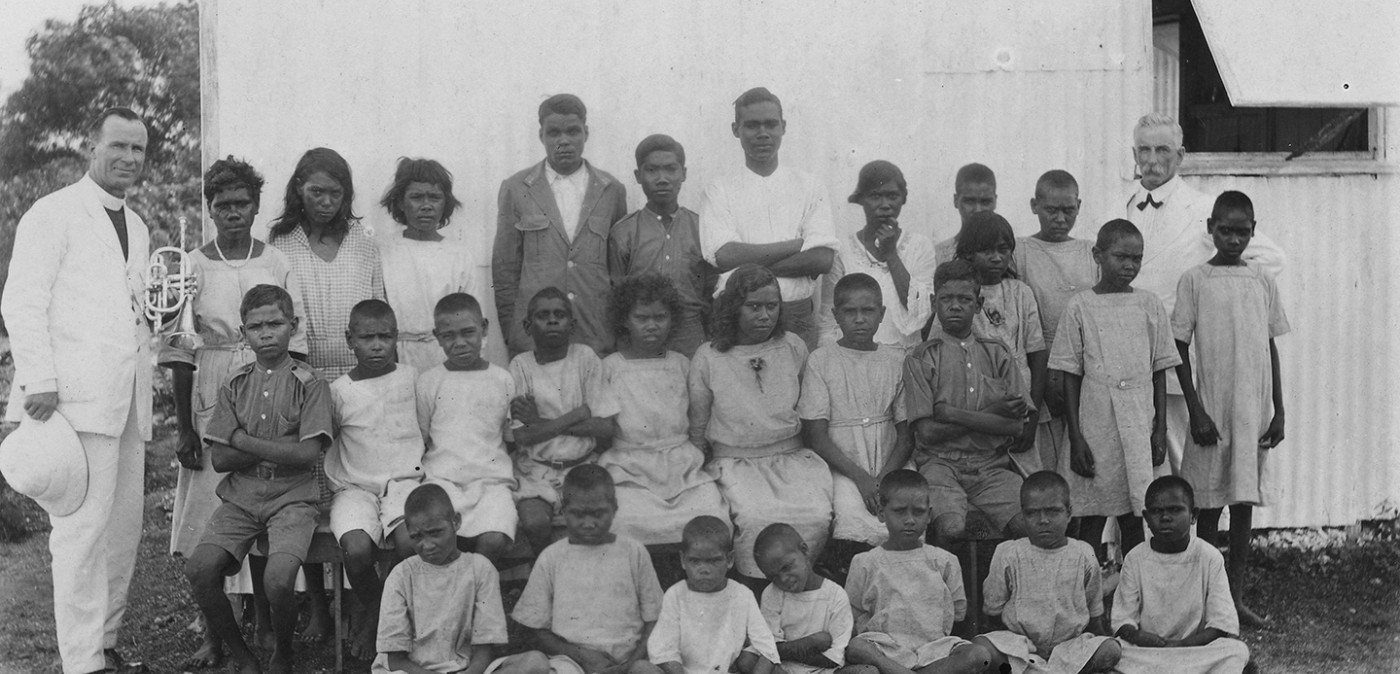
The Stolen Generation, a term that evokes both profound sorrow and unwavering resilience, represents one of the darkest chapters in Australian history. This period, spanning from the late 19th century to the 1970s, witnessed the systematic removal of Aboriginal and Torres Strait Islander children from their families and communities. This forcible assimilation policy, driven by a misguided belief in the superiority of European culture and a desire to "civilize" Indigenous Australians, inflicted immeasurable damage, leaving behind a legacy of intergenerational trauma, loss of identity, and a profound disconnect from cultural heritage.
The Roots of a Cruel Policy
Related Articles: The Stolen Generation: A Legacy of Loss, Identity, and the Fight for Reckoning
- A Taste Of The Outback: Exploring The Delicious World Of Australian Native Fruits
- A Deep Connection: How Aboriginal Peoples’ Relationship With The Land Ensured Economic Survival
- Unveiling The Soul Of The Land: Exploring The Captivating Sounds Of Australian Aboriginal Instruments
- Uncovering The Rich Tapestry Of Aboriginal Tribes In The Northern Territory: A Journey Through The Heart Of Sudan
- Uncovering Australia’s Indigenous Heritage: A Guide To Aboriginal Reserves On Maps
The Stolen Generation policy was rooted in a complex interplay of factors, including:
- Colonialism and Racial Prejudice: The arrival of European settlers in Australia brought with it a deep-seated belief in white supremacy and the inherent inferiority of Indigenous people. This prejudice fueled the desire to erase Aboriginal culture and assimilate Indigenous children into European society.
- The Protectionist Movement: This movement, which gained momentum in the late 19th century, aimed to "protect" Aboriginal people from themselves, often justifying their removal from their families and communities.
- The Assimilation Policy: This policy, formally adopted in the 1930s, sought to absorb Indigenous people into the dominant white Australian society by removing their children from their families and placing them in foster homes, missions, or institutions. The goal was to erase Indigenous culture and language, and to create a "white" Australia.
The Devastating Impact on Individuals and Communities
The impact of the Stolen Generation policy on individuals and communities was profound and enduring:
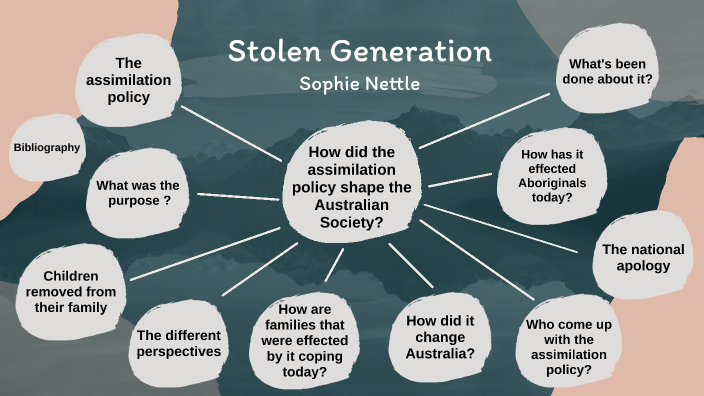
- Loss of Family and Community: The forcible separation of children from their families and communities severed vital connections to their cultural heritage, language, and traditions. This loss created a deep sense of displacement and alienation, leaving many struggling to find their place in the world.
- Cultural Dispossession: Children were often subjected to harsh punishments for speaking their native languages, practicing their cultural traditions, and maintaining their Indigenous identity. This forced assimilation resulted in a loss of cultural knowledge and a disconnect from their ancestral heritage.
- Intergenerational Trauma: The trauma experienced by the Stolen Generation has had a lasting impact on subsequent generations. Children who were removed from their families often faced abuse, neglect, and a lack of cultural support, leading to mental health issues, addiction, and other social problems. This trauma has been passed down through generations, creating a cycle of pain and suffering.
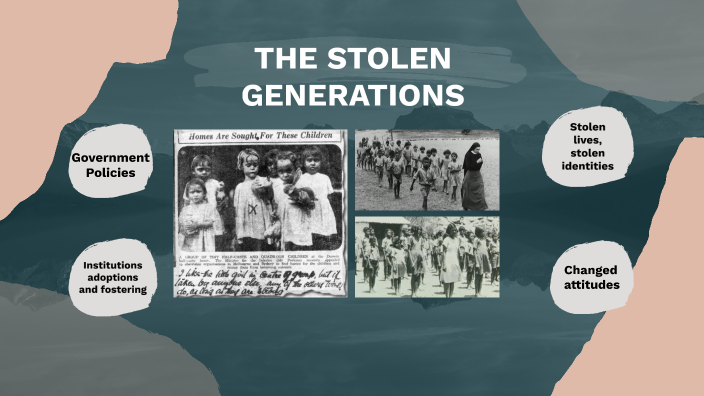
The Fight for Recognition and Reconciliation
Despite the devastating impact of the Stolen Generation policy, Indigenous Australians have shown remarkable resilience and determination in their fight for recognition and reconciliation.
- The Bringing Them Home Report: This landmark report, published in 1997, documented the history of the Stolen Generation and its impact on individuals and communities. It called for a national apology and compensation for those who were forcibly removed.
- The National Apology: In 2008, the Australian government issued a formal apology to the Stolen Generation, acknowledging the injustice and suffering inflicted on Indigenous people.
- The National Indigenous Australians Agency (NIAA): This government agency was established in 2019 to support Indigenous Australians and address the ongoing effects of the Stolen Generation.
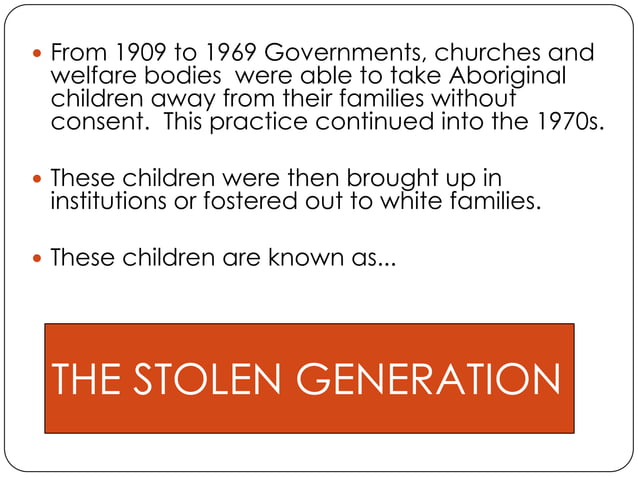
The Legacy of the Stolen Generation
The Stolen Generation remains a painful reminder of the systemic racism and injustice that Indigenous Australians have faced. However, it also serves as a powerful reminder of the strength and resilience of Indigenous people.
The fight for justice continues, as Indigenous communities strive to heal from the wounds of the past and rebuild their cultural heritage. The Stolen Generation serves as a cautionary tale, urging us to learn from the mistakes of the past and work towards a future where all Australians are treated with dignity and respect.
FAQs about the Stolen Generation:
1. When did the Stolen Generation occur?
The Stolen Generation policy was in effect from the late 19th century to the 1970s.
2. Why were Aboriginal children removed from their families?
The main reason for the removals was a misguided belief that Indigenous children would be better off being raised in European society, and that this would help to assimilate them into the dominant culture.
3. What were the conditions like in the institutions where children were placed?
The conditions in many of these institutions were harsh and often abusive. Children were denied their cultural heritage and often subjected to physical and emotional abuse.
4. What are the long-term effects of the Stolen Generation?
The Stolen Generation has had a devastating and long-lasting impact on individuals and communities. This includes intergenerational trauma, loss of identity, mental health issues, and social problems.
5. What is being done to address the legacy of the Stolen Generation?
The Australian government has issued a national apology and is working to address the ongoing effects of the Stolen Generation through programs and initiatives aimed at reconciliation and healing.
6. What can I do to learn more about the Stolen Generation?
There are many resources available to learn more about the Stolen Generation, including books, documentaries, websites, and museums. You can also support organizations that work to address the legacy of the Stolen Generation.
The Stolen Generation is a complex and painful chapter in Australian history. It is important to understand and acknowledge the injustices that were inflicted on Indigenous Australians, and to work towards a future where all Australians are treated with equality and respect.
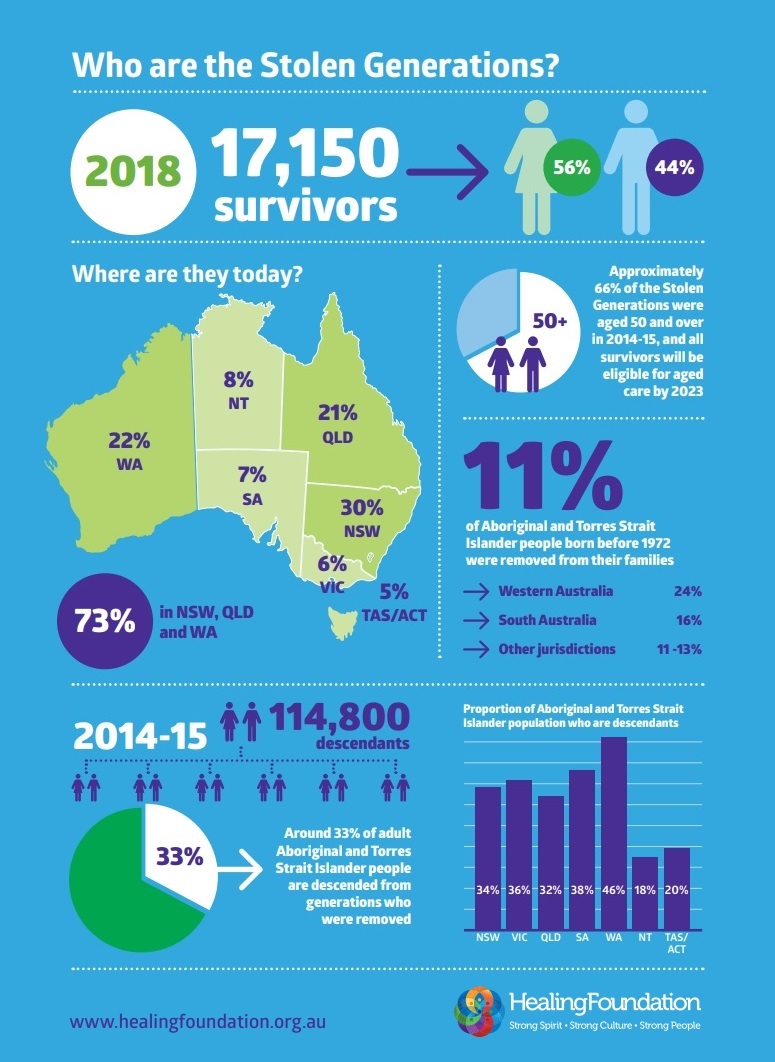
Closure
Thus, we hope this article has provided valuable insights into The Stolen Generation: A Legacy of Loss, Identity, and the Fight for Reckoning. We hope you find this article informative and beneficial. See you in our next article!


